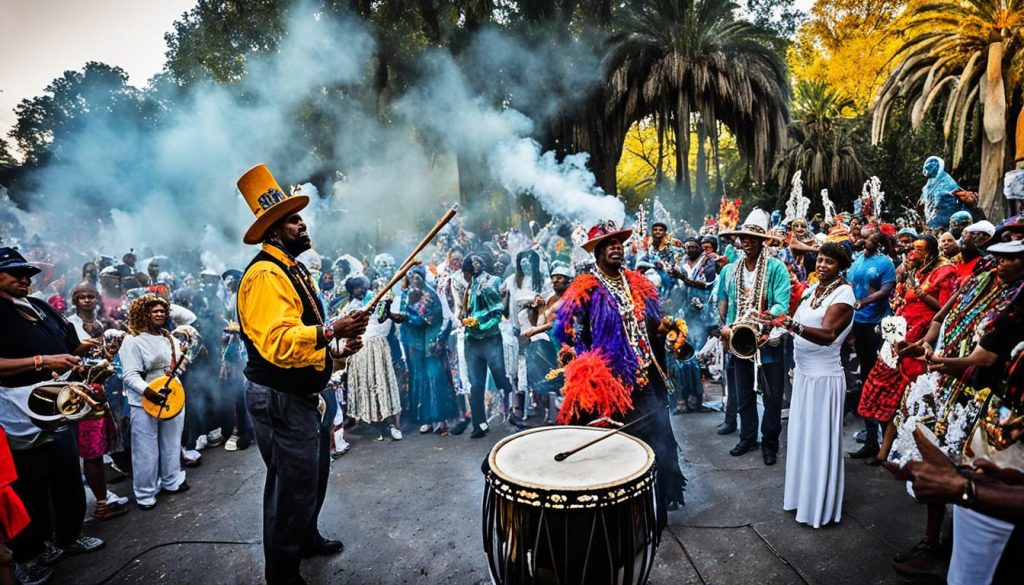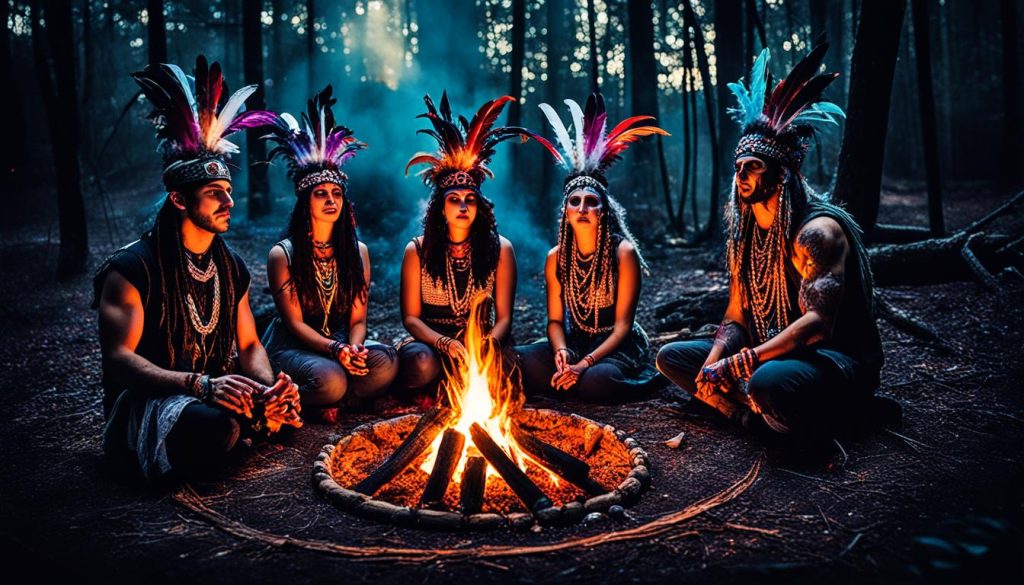Is voodoo magic in New Orleans a captivating reality or just a fascinating myth? Delve into the mystical world of New Orleans voodoo to uncover the truth behind this enigmatic practice.
New Orleans voodoo, also known as Voodoo-Catholicism, traces its roots back to the religious rituals and beliefs of enslaved West Africans who merged their traditions with the local Catholic population. This unique blend of cultures gave birth to a vibrant and mesmerizing spiritual practice that encompasses dance, music, chanting, and even snakes.
Today, voodoo continues to thrive in New Orleans, playing an integral role in the city’s rich cultural tapestry. You’ll find voodoo shops, museums, and temples dedicated to preserving and showcasing the traditions of this intriguing faith.
Explore the origins of voodoo in New Orleans, the spiritual ceremonies held in historic locations like Congo Square, and the influential figures such as Marie Laveau, the renowned voodoo queen. Uncover the secrets of St. John’s Eve, a captivating voodoo celebration held annually. And discover how voodoo remains a living, breathing part of modern-day New Orleans, with private rituals and prominent voodoo temples and shops.
Join us on a journey through the mystique of New Orleans voodoo, where ancient beliefs and modern practices converge. Prepare to be mesmerized by the captivating allure of voodoo magic in the heart of New Orleans.
Get ready to explore the mystique of New Orleans voodoo as we uncover its fascinating history, dispel the myths, and embrace the reality of this enchanting spiritual practice.
Origins of Voodoo in New Orleans
Voodoo in New Orleans has a fascinating history that can be traced back to its origins in West Africa. Enslaved West Africans brought their religious practices to Louisiana and merged them with the traditions of the local Catholic population. This fusion resulted in the birth of New Orleans Voodoo, a unique spiritual practice that combines elements of African and Catholic beliefs.
During the 1800s, voodoo became an important part of the culture for many free people of color in New Orleans. Voodoo queens and kings emerged as influential figures, wielding both spiritual and political power. They guided their followers and communities through spiritual rituals and acted as intermediaries between the physical and spiritual worlds.
The core belief of New Orleans Voodoo revolves around the connection with spirits. Through rituals such as dance, music, chanting, and snake handling, practitioners seek to establish a profound connection with the spiritual realm. These rituals serve as a conduit for communication, healing, and guidance from the spirits.
Today, the history and origins of voodoo in New Orleans continue to fascinate locals and visitors alike. The city’s streets are filled with the echoes of the past, where the spiritual practices of voodoo have left an indelible mark on its culture and heritage.
Voodoo in Practice: Congo Square
Congo Square, located in Armstrong Park, holds a significant place in the history of voodoo practices in New Orleans. As a gathering place for enslaved Africans, this sacred space became a sanctuary where African traditions and expressions of culture, including voodoo, were preserved.
Imagine hundreds of people coming together, their rhythms and voices harmonizing in vibrant drum circles and spiritual ceremonies. This lively convergence of cultures and beliefs created an atmosphere of energy and connection.

Today, the spirit of voodoo can still be experienced in various locations throughout New Orleans. The Voodoo Spiritual Temple and the New Orleans Historic Voodoo Museum offer visitors the opportunity to learn about the history and practices of voodoo. These places serve as gateways for curious souls seeking insight into this captivating spiritual tradition.
Explore the relics and artifacts of voodoo, immerse yourself in stories of its practitioners, and gain a deeper understanding of the rituals and beliefs that have shaped New Orleans culture. Allow the magic of Congo Square to guide you on a journey of discovery and connection with voodoo practices.
Famous Voodoo Personalities and Practitioners
Marie Laveau, the most famous voodoo queen, was a devout Catholic who lived in the French Quarter of New Orleans. She was known for her spiritual and healing abilities and was consulted by politicians, lawyers, and businessmen. Another prominent figure in New Orleans voodoo history is Dr. John, a voodoo king who taught Marie Laveau. These individuals played significant roles in the voodoo community and influenced the practice of voodoo in New Orleans.
To this day, Marie Laveau remains a legendary figure in New Orleans voodoo. Her influence on voodoo practice and her reputation as a powerful healer and spiritual leader have made her a symbol of voodoo queens. She continues to inspire voodoo practitioners around the world.
Voodoo Celebrations: St. John’s Eve
St. John’s Eve is a vibrant and enchanting voodoo celebration that takes place annually on June 23 in the heart of New Orleans. This lively event, originating in the 1830s by the renowned voodoo queen Marie Laveau, is a captivating blend of ancient traditions and modern revelry.
The highlight of St. John’s Eve is the head-washing ritual, where participants cleanse themselves with water infused with special herbs and sacred symbols. This ritual is believed to provide spiritual purification and protection. The head-washing ceremony is followed by a joyous public party that immerses attendees in the spirit of voodoo celebrations.
The festivities take place at the picturesque Bayou St. John, a serene and mystical location that serves as the backdrop for this extraordinary gathering. As participants come together to honor their ancestors and connect with the divine, they also have the opportunity to participate in the head-washing ritual, guided by experienced voodoo practitioners.
St. John’s Eve holds great significance in the voodoo calendar, showcasing the rich cultural heritage and spiritual traditions of voodoo in New Orleans. The celebration embodies the essence of voodoo, fostering a sense of unity, empowerment, and reverence for the unseen forces that shape our lives.

As the rhythmic beats of drums fill the air and the warm glow of bonfires illuminates the night sky, St. John’s Eve creates an enchanting atmosphere that captivates the senses and leaves a lasting impression on all who experience it. It is a testament to the resilience and beauty of voodoo, a living tradition that continues to thrive amidst the vibrant cultural tapestry of New Orleans.
Modern Day Voodoo in New Orleans
Voodoo, a spiritual practice that connects individuals with their ancestors and spirits, continues to thrive in present-day New Orleans. While most rituals are held privately, there are a few notable voodoo temples and museums where visitors can immerse themselves in the rich history and experience some of the voodoo practices firsthand.
One such place is the Voodoo Spiritual Temple, where visitors can learn about the origins and beliefs of voodoo through guided tours and interactive exhibits. Located in the heart of New Orleans, this temple offers a glimpse into the world of voodoo, showcasing ancient artifacts, ritual objects, and sacred spaces.
Voodoo Shops in New Orleans
To further explore the modern voodoo culture, visitors can also visit various voodoo shops scattered throughout the city. These shops offer a wide range of voodoo-related products and services, catering to both tourists and locals alike.
- The Island of Salvation Botanica is a popular voodoo shop that specializes in spiritual products, herbs, and candles used in voodoo rituals. Visitors can find everything from voodoo dolls to spell kits, as well as seek guidance from the knowledgeable staff.
- The New Orleans Historic Voodoo Museum not only provides a historical overview but also operates a unique voodoo shop on-site. Here, visitors can purchase voodoo charms, talismans, and other symbolic objects associated with the practice.
- The Healing Center is a vibrant community space that houses various alternative wellness shops, including one dedicated to voodoo. Visitors can explore the range of voodoo-related services, such as tarot card readings and spiritual consultations.
Embracing modern voodoo practices and traditions allows visitors to New Orleans to gain a deeper understanding of this ancient spiritual belief system. Whether it’s exploring voodoo temples or browsing through voodoo shops, the experience offers a unique glimpse into the cultural fabric of New Orleans.
Conclusion
Voodoo is an integral part of New Orleans culture and history. With its origins rooted in West Africa, this spiritual practice has evolved and assimilated elements of Catholicism and local influences. Despite the misconceptions and stereotypes surrounding voodoo, it continues to be practiced in New Orleans, attracting visitors who seek to explore its rich spiritual and cultural traditions.
If you plan to visit New Orleans, immersing yourself in voodoo practices and learning about its history can provide a truly unique and captivating experience. From the historic voodoo temples and museums to the bustling voodoo shops scattered throughout the city, there are ample opportunities to delve deeper into this vibrant tradition.
By engaging with voodoo rituals and delving into the background of prominent voodoo personalities like Marie Laveau, you can gain a deeper appreciation for the significance of voodoo in New Orleans. Whether you are a history enthusiast or someone seeking a spiritual connection, voodoo offers an intriguing avenue to explore New Orleans’ diverse cultural tapestry.